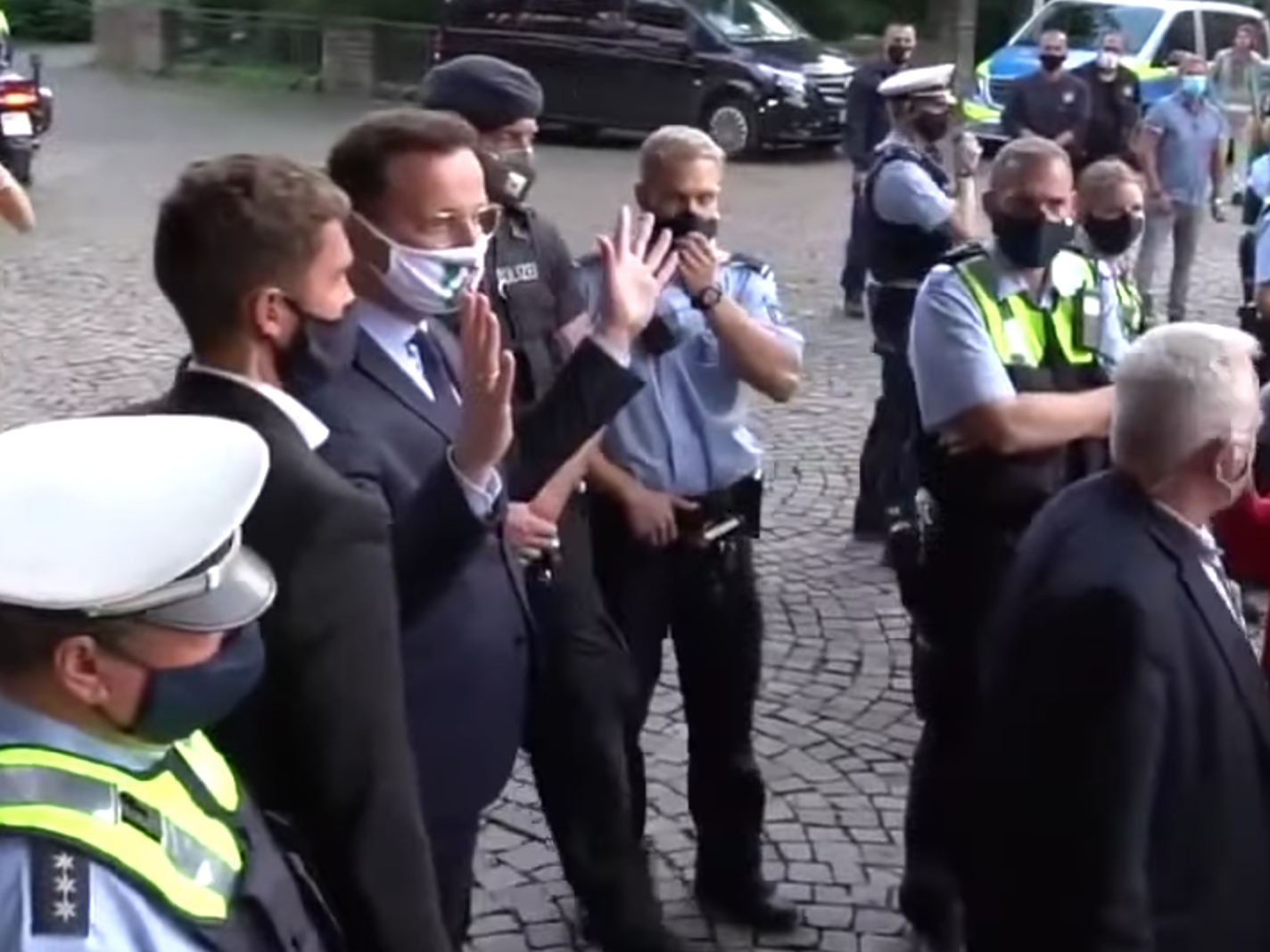Coronavirus: Lockdown protesters ‘spit on’ and shout homophobic slurs at German health minister
‘Discussing with one another is democracy. It is not roaring and insulting,’ Jens Spahn responds

Germany’s health minister has been subjected to homophobic abuse and allegedly spat on while attempting to engage with a crowd of anti-lockdown protesters, as opponents of the country’s pandemic restrictions appear increasingly emboldened.
Jens Spahn faced down the two dozen or so demonstrators gathered outside a community centre in which he was campaigning on Sunday ahead of local elections in Bergisch-Gladbach.
Now viral footage showed the Christian Democrats (CDU) politician appealing for calm from the crowd as some in the crowd yelled “disgrace” and “gay pig”.
North Rhine-Westphalia Police said in a statement on Monday that they had no evidence that the minister was spat on, but that a criminal complaint had been filed against a 39-year-old man who “insulted” Mr Spahn.
Mr Spahn, whose handling of the pandemic has seen him become a figure of hatred for sceptics and conspiracy theorists despite his overall ratings rising, condemned the reaction he received on Sunday.
“Discussing with one another is democracy. It is not roaring and insulting,” he tweeted on Monday.
“A small group may be loud. The vast majority of citizens stick together despite some hardships in the crisis and help. That makes us strong. We respect each other and continue to take care of each other!”
German economy minister Peter Altmaier went further in his criticism, tweeting: “Anyone who spits at and molests democratically elected politicians infringes the German constitution and makes an outsider of themselves.”
It comes amid rising concern at an increasingly vocal coalition of far-right activists, anti-vaxxers and conspiracy theorists attempting to capitalise on fatigue at the restrictions, many of whom were among a crowd of 30,000 who gathered in Berlin to protest coronavirus restrictions on Saturday.
Apparently emboldened by baseless rumours that a supportive Donald Trump was also in the city, hundreds of demonstrators – some brandishing the flag of the German Reich of 1871-1918 and other far-right banners – attempted to storm the Reichstag on Saturday night.
Many of them managed to breach a security barrier outside the Reichstag, the burning of which a month after the Nazis came to power in 1933 was used by Adolf Hitler as an excuse to crack down on civil liberties.
The demonstrators on Sunday were intercepted by police and forcibly removed. Some 300 protesters were arrested, police said.
“Reich flags and right-wing extremist provocations in front of the German Bundestag are an unbearable attack on the heart of our democracy,” said Germany’s president, Frank-Walter Steinmeier, after a meeting with three police officers who stood alone against the protesters until reinforcements arrived. “We will never accept this.”
Mr Steinmeier defended the right of those protesting against the coronavirus measures to demonstrate, but admonished them not to allow themselves to be co-opted by the extreme right with a different agenda.
Opinion polls show only one in 10 Germans reject the country’s current prevention measures, such as the requirement to wear masks on public transport, in stores and in some public buildings, while 60 per cent said they are exactly right and 28 per cent that they were not strict enough.
Additional reporting by AP
Join our commenting forum
Join thought-provoking conversations, follow other Independent readers and see their replies
Comments
Bookmark popover
Removed from bookmarks